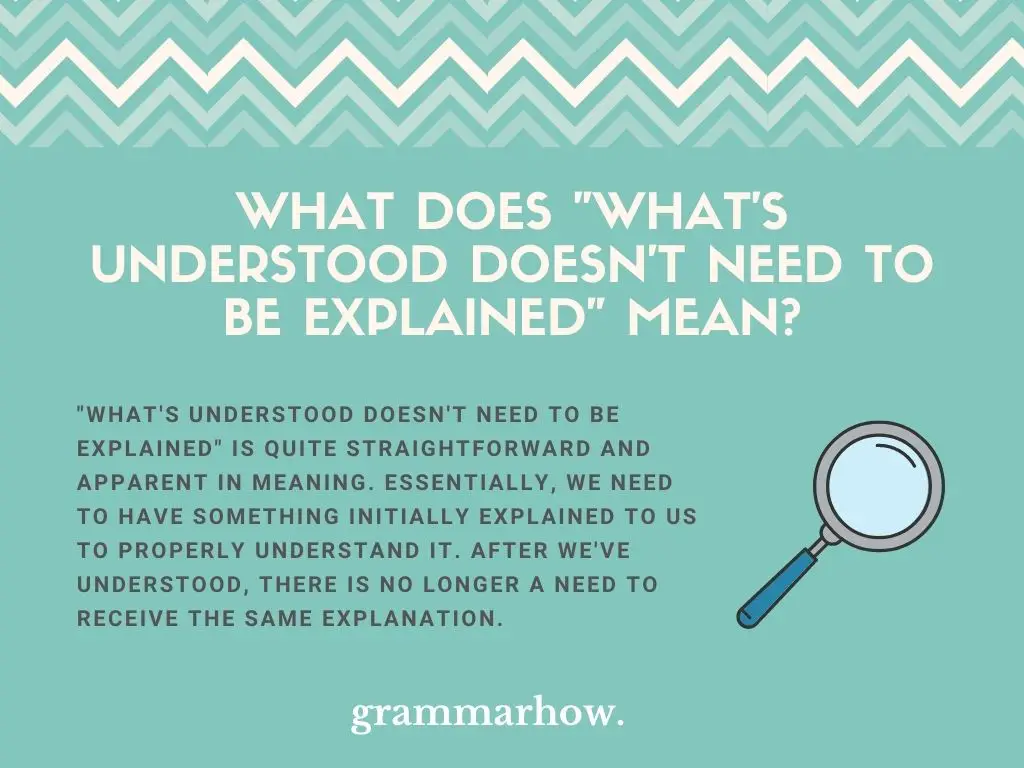We often say “what’s understood doesn’t need to be explained” to reiterate that if we are already knowledgeable about something, then there is no need for an explanation. In this article, we will go over the meaning and appropriate use of this phrase.
What Does “What’s Understood Doesn’t Need To Be Explained” Mean?
“What’s understood doesn’t need to be explained” is quite straightforward and apparent in meaning. Essentially, we need to have something initially explained to us to properly understand it. After we’ve understood, there is no longer a need to receive the same explanation.

We use this statement to express that we have been previously taught something so that we could understand, or we understand without ever needing or receiving an explanation. Either way, we are essentially claiming that we do not need to be given a further explanation on this topic.
Often, when we receive additional information on a subject or specific topic that we are already very knowledgeable on, we feel as though it is entirely redundant. When we say that something is redundant, we are meaning to express that it is no longer necessary or useful to us.
An excellent example to help explain this is, if you are already an experienced and highly competent pilot, you do not require the basics of pilot training explained to you. This information would be highly unnecessary, as you have already retained the highest level of comprehension.
What Is The Origin Of “What’s Understood Doesn’t Need To Be Explained”?
To understand where the phrase “what’s understood doesn’t need to be explained”, it’s important that we first look at the origin of some of the key terms. The term “understood”, in the past tense and past participle of “understand”. Understand originated from the Old English word “understandan”.
The term “need” comes from the Middle English word “nede” and the Old English word nied. The term “explained” is the past tense of the word “explain”. “Explain” originated from the late Middle English word “planus”, and the Latin word “explanare”.
The older versions of the terms “understand”, “need”, and “explain”, all carry consistent meanings with that of their modern-day spellings. Therefore, the phrase “what’s understood doesn’t have to be explained” has strong ties to an English origin, with many of the main terms deriving from Middle and Old English writings.
Examples Of How To Use “What’s Understood Doesn’t Need To Be Explained” In A Sentence
Here are some examples of how we can use this phrase in a sentence:
- I’ve read that entire book already and what’s understood doesn’t need to be explained.
- I appreciate that you are trying to give me further information, but what’s understood doesn’t need to be explained again.
- What’s understood doesn’t need to be explained, so while I comprehend what you are trying to teach me, I’m already well-rehearsed on the subject. Therefore, any further explanation is entirely unnecessary.
- I’m a very accomplished professional basketball player and what’s understood doesn’t need to be explained. Thank you, for the suggestions though.
- What’s understood doesn’t need to be explained, so there’s absolutely no need for you to feel like you have to waste your time on me.
- What’s understood doesn’t need to be explained and he’s an incredibly gifted child. I genuinely don’t believe he needs another lesson on that particular subject.
- I don’t understand why the teacher kept trying to explain it to me – she knows I got a perfect grade on my test. I thought what’s understood doesn’t need to be explained repetitively!
- What’s understood doesn’t need to be explained, but if you ever require a refresher, please don’t hesitate to ask me for assistance.
Synonyms For “What’s Understood Doesn’t Need To Be Explained”
We will now go over some useful synonym phrases for “what’s understood doesn’t have to be explained”:
- A nod is as good as a wink to a blind horse.
- There’s no need to discuss something you’re already vastly knowledgeable about.
- When you know, you just know.
- If something is greatly understood, an explanation is redundant.
- If you are in the know, no explanation is necessary.
- When someone’s knowledgeable, why belabour the point?
- Whatever is clearly understood, does not require further explanation.
- If you get what I mean, I don’t need to clarify more.

Martin holds a Master’s degree in Finance and International Business. He has six years of experience in professional communication with clients, executives, and colleagues. Furthermore, he has teaching experience from Aarhus University. Martin has been featured as an expert in communication and teaching on Forbes and Shopify. Read more about Martin here.
